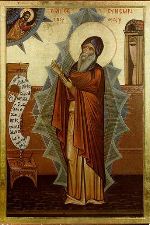Friday, October 22, 2010
Poem by Symeon the NewTheologian

We awaken in Christ's body
By Symeon the New Theologian
(949 - 1032)
English version by Stephen Mitchell
We awaken in Christ's body
as Christ awakens our bodies,
and my poor hand is Christ, He enters
my foot, and is infinitely me.
I move my hand, and wonderfully
my hand becomes Christ, becomes all of Him
(for God is indivisibly
whole, seamless in His Godhood).
I move my foot, and at once
He appears like a flash of lightning.
Do my words seem blasphemous? -- Then
open your heart to Him
and let yourself receive the one
who is opening to you so deeply.
For if we genuinely love Him,
we wake up inside Christ's body
where all our body, all over,
every most hidden part of it,
is realized in joy as Him,
and He makes us, utterly, real,
and everything that is hurt, everything
that seemed to us dark, harsh, shameful,
maimed, ugly, irreparably
damaged, is in Him transformed
and recognized as whole, as lovely,
and radiant in His light
he awakens as the Beloved
in every last part of our body.
|
I found this poem from Ivan Granger's Poetry Chaikha this morning, and could not resist printing it here. What follows just below is Ivan's summary of Symeon's life: |
Symeon was born into an aristocratic family in Asia Minor (Turkey) and was given the name George. This was when the region was still part of the Christian Byzantine Empire. From boyhood he was groomed for a life in politics. At age eleven, he was sent to the capital Constantinople (Istanbul) to live with his uncle who guided him in his early education. When he was 14, George met a monk at the the monastery of Studios named Symeon the Pious. George accepted Symeon the Pious as his spiritual director while continuing to prepare for a life in politics. Somewhere around age 20, George was overcome by an ecstatic state in which, as with many other mystics, he experienced God as a living presence of radiant light. Despite this radically transformative experience, he spent several more years attempting to fulfill his family's expectations, eventually becoming an imperial senator. However, his continuing mystical experiences were not compatible with such a public life and, at age 27, he renounced his previous life and became a monk, entering the monastery at Studios to continue under the direct guidance his spiritual director, even taking on the same monastic name -- Symeon. Symeon was ordained a priest and eventually became the abbot of the St. Mamas monastery. The mystical spiritual practicesthat he advocated and his growing reverence for Symeon the Pious after the elder Symeon's death led to conflicts with authorities and Symeon was exiled in 1009 to a small hermitage on the far side of the Bosphorus. Disciples began to gather around Symeon and soon the small hermitage grew into a full monastery.
(now back to me): Symeon the New Theologian is one of my favorites among all the early religious writers. He was someone who not only thought of God constantly as he practiced religious devotions as a monk, he actually felt God (Christ) in his body. I suspect that he was filled with what we might call Kundalini bliss or divine love. In fact, you can read his poem substituting "The Divine" or "The Beloved" or even "The Goddess" wherever he refers to "Christ", and the essential sense of the poem will be the same. Divine love is the same, however it may be expressed in words or theological terms.
The poem is an accurate depiction of what happens when Kundalini bliss awakens, no matter what vocabulary is used to express it.
